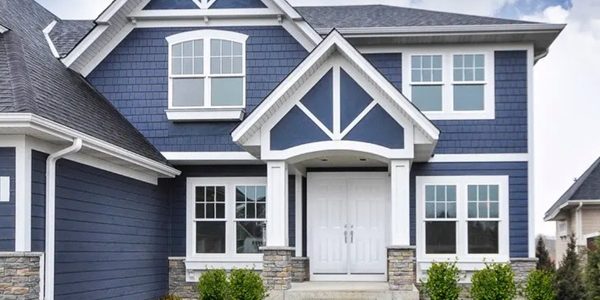We offer all types of vinyl siding, metal wrapping, and even wood siding replacements. Our sales guys know exactly what to look for and do a great job of helping you choose the best options for your home without breaking the bank. If your exterior siding is coming apart and needs to be replaced you can count on us to provide high quality and durable exterior siding. Giving your home a new look with our siding repair service.
Siding Repair & Installation Virginia Beach
Vinyl Siding
Vinyl siding is one of the most popular siding options because of its durability, affordability, and low maintenance requirements. Vinyl siding is composed of a PVC (polyvinyl chloride) material designed to imitate painted wood siding without the upkeep. Homeowners who are looking for a long-lasting, budget-friendly siding that requires very little maintenance.
Benefits of Vinyl Siding
-
Low Maintenance: No painting, staining, or sealing required.
-
Affordable: One of the most cost-effective siding options.
-
Durable: Resists moisture, rot, insects, and fading.
-
Versatile Styles: Comes in many colors and textures, including woodgrain looks.
-
Energy-Efficient Options: Insulated vinyl boosts home efficiency.
Metal Wrapping
Metal wrapping is used to cover exterior trim elements such as fascia, soffits, columns, rake boards, and window casings. It is composed of sheets of aluminum or metal-coated material that are custom-bent to wrap and protect wood trim. This siding option is the preferred choice for homeowners who are wanting to eliminate yearly trim painting and protect high-exposure wood areas around the home.
Benefits
-
Protects Wood Trim: No more peeling paint or rot.
-
Very Low Maintenance: Just rinse occasionally; never needs painting.
-
Weather Resistant: Excellent durability against rain, UV rays, and moisture.
-
Prevents Rot & Insects: Acts as a protective shield for vulnerable wood.
-
Clean, Finished Look: Provides smooth and modern trim lines.
Wood Siding Replacements
Wood siding gives homes a classic, natural look and is valued for its beauty, custom finish, and traditional craftsmanship. Made with natural wood boards or shingles from materials such as cedar, pine, redwood, or engineered wood. Wood siding is best for homeowners who value natural beauty and are willing to maintain their home’s exterior to preserve durability and appearance.
Benefits
-
Beautiful Aesthetic: Warm, natural appearance with unmatched curb appeal.
-
Customizable: Can be painted or stained in any color.
-
Eco-Friendly: Wood is a renewable, biodegradable material.
-
Repairable: Individual boards can be replaced without removing large sections.
Siding Repair & Installation Frequently Asked Questions
You should consider replacing your siding if you notice:
- Cracks or Holes: Visible damage that can allow moisture to seep in.
- Fading or Peeling: Significant loss of color or paint chipping away.
- Warping or Buckling: Siding that appears warped or bent out of shape.
- Mold or Mildew: Persistent growth of mold or mildew, indicating moisture problems.
- High Energy Bills: Increased heating or cooling costs could be due to poor insulation from damaged siding.
- Interior Damage: Peeling paint or wallpaper inside the house can indicate moisture penetration.
Yes, replacing siding is worth it. New siding can:
- Increase Home Value: Boost your property’s curb appeal and resale value.
- Improve Energy Efficiency: Modern siding materials can provide better insulation, reducing energy bills.
- Protect Against Elements: Provide better protection against weather conditions, preventing further damage to the home’s structure.
- Enhance Appearance: Give your home a fresh, updated look.
The lifespan of siding varies depending on the material:
- Vinyl Siding: Typically lasts 20-40 years.
- Wood Siding: Can last 15-40 years with proper maintenance.
- Fiber Cement Siding: Usually lasts 25-50 years.
- Aluminum Siding: Often lasts 20-50 years. Regular maintenance and local climate conditions can impact these timeframes.
Yes, it is possible to replace siding in the winter, although there are some challenges. Cold weather can make materials more brittle and harder to work with, and it may be less comfortable for the installation crew. However, experienced contractors can successfully replace siding during winter with the right tools and techniques. Winter replacements can also help prepare your home for the colder months.
It is generally not recommended to put new siding over old siding. This approach can:
- Hide Problems: Conceal underlying issues such as rot or mold.
- Add Weight: Increase the structural load on your home.
- Reduce Insulation Efficiency: Compromise the insulating properties of the new siding. For the best results, it’s advisable to remove the old siding before installing new siding.
Neglecting to replace damaged or old siding can lead to:
- Moisture Damage: Water can seep in, causing rot, mold, and mildew.
- Structural Damage: Prolonged exposure to the elements can weaken the home’s structure.
- Increased Energy Costs: Poor insulation from damaged siding can lead to higher heating and cooling bills.
- Decreased Home Value: A worn-out exterior can negatively impact your home’s curb appeal and resale value.
| Feature | Vinyl Siding | Metal Wrapping | Wood Siding |
|---|---|---|---|
| Maintenance | Very Low | Very Low | High |
| Cost | Low | Moderate | Higher |
| Durability | High | Very High | Moderate |
| Appearance | Varied colors/textures | Sleek trim finish | Natural, classic |
| Repairs | Easy | Rarely needed | Easy (but more frequent) |
| Lifespan | 20–40+ years | 30–50+ years | 10–30+ years (with maintenance) |


